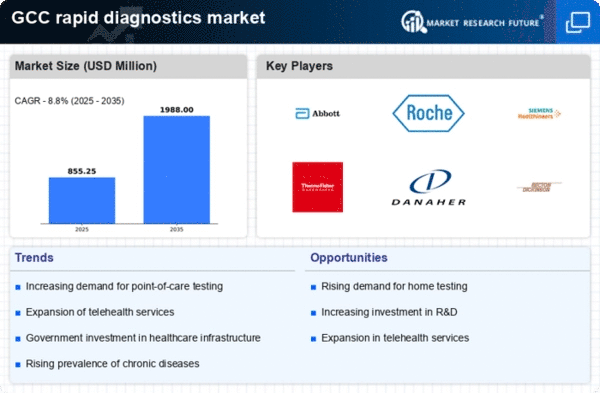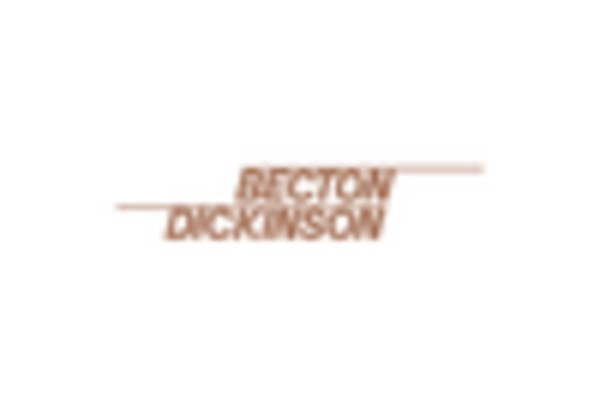Government Initiatives and Funding
Government support plays a crucial role in the growth of the rapid diagnostics market. In the GCC, various initiatives aimed at enhancing healthcare infrastructure and accessibility are being implemented. Increased funding for healthcare projects and research is likely to bolster the development of rapid diagnostic technologies. For example, several GCC countries have launched national health strategies that prioritize the integration of advanced diagnostic tools into healthcare systems. This governmental backing not only facilitates innovation but also encourages public-private partnerships, which are essential for advancing the rapid diagnostics market. As a result, the market is expected to expand, driven by enhanced resources and strategic initiatives.
Rising Prevalence of Chronic Diseases
The increasing incidence of chronic diseases in the GCC region is a pivotal driver for the rapid diagnostics market. Conditions such as diabetes, cardiovascular diseases, and respiratory disorders are becoming more prevalent, necessitating timely and accurate diagnostic solutions. According to recent health statistics, the prevalence of diabetes in the GCC has reached alarming levels, with estimates suggesting that around 20% of the adult population is affected. This surge in chronic conditions drives demand for rapid diagnostic tools that can facilitate early detection and management, thereby enhancing patient outcomes. The rapid diagnostics market is likely to benefit from this trend, as healthcare providers seek efficient solutions to address the growing burden of chronic diseases.
Increased Focus on Preventive Healthcare
There is a notable shift towards preventive healthcare in the GCC, which significantly influences the rapid diagnostics market. Governments and health organizations are increasingly promoting health screenings and early detection programs to mitigate the impact of diseases. This proactive approach is reflected in various national health initiatives aimed at reducing healthcare costs and improving population health. The rapid diagnostics market is poised to thrive as more individuals seek out diagnostic tests that can identify health issues before they escalate. The emphasis on preventive measures is expected to drive innovation and adoption of rapid diagnostic technologies, ultimately leading to improved health outcomes across the region.
Growing Demand for Home Healthcare Solutions
The demand for home healthcare solutions is on the rise in the GCC, significantly impacting the rapid diagnostics market. As patients increasingly prefer receiving care in the comfort of their homes, there is a corresponding need for diagnostic tools that can be used outside traditional clinical settings. This trend is particularly relevant for chronic disease management, where regular monitoring is essential. The rapid diagnostics market is likely to see a surge in the development of user-friendly, portable diagnostic devices that cater to this demand. The convenience and accessibility of home healthcare solutions are expected to drive growth in the market, as they empower patients to take charge of their health.
Technological Innovations in Diagnostic Tools
Technological advancements are reshaping the landscape of the rapid diagnostics market. Innovations such as point-of-care testing, mobile health applications, and advanced biomarker detection methods are enhancing the speed and accuracy of diagnostics. The GCC region is witnessing a surge in the adoption of these technologies, driven by the need for rapid results in clinical settings. For instance, the market for point-of-care testing devices is projected to grow at a CAGR of over 10% in the coming years. This growth indicates a strong demand for rapid diagnostics market solutions that can deliver timely results, thereby improving patient management and treatment outcomes.
















